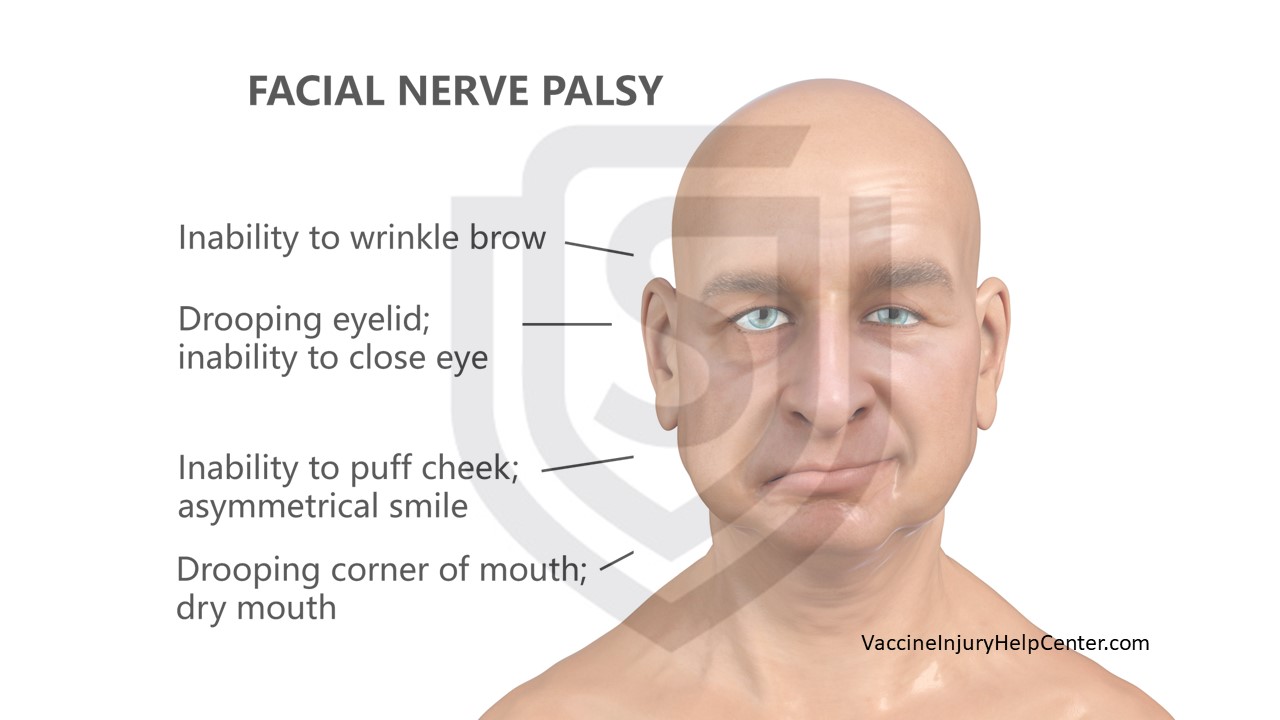Bell’s palsy is a symptom of damage to facial nerves. Bell’s palsy can be caused by a number of things, including vaccines.
What is Bell’s Palsy?
Bell’s palsy is facial muscle weakness caused by nerve damage. This damage occurs to the facial nerves and may cause one side of your face to droop or sag and make it difficult for you to control that side of your face.
Bell’s palsy is not a disease; rather it is a symptom of damage to facial nerves from vaccines, bacteria, viruses, cancer, trauma (such as a car accident), stroke, or even diabetes.
Bell’s palsy occurs after damage to the facial nerve, one of the 12 cranial nerves. For more information on the cranial nerves read below.
What are the symptoms of Bell’s palsy?
Facial muscle weakness is the number 1 symptom of Bell’s palsy. This weakness can cause an inability to close one eye, drooling or excessive saliva, loss of taste sensation on part or all of the tongue, difficulty eating and drinking due to lack of feeling in the mouth area, pain around the jawline, ringing in one ear (tinnitus), or hearing loss.
Can vaccines cause Bell’s palsy?
Yes. Vaccines can cause nerve damage like Bell’s palsy. The most common triggers are the flu, live virus vaccines like MMR, and the chickenpox vaccine. Bell’s palsy has also been linked to other vaccines like tetanus.
The risk of developing Bell’s palsy after vaccination increases if you are at an increased risk for developing this condition.
Conditions that increase your risk for developing vaccine-caused Bell’s palsy:
- People who have had a previous episode of Bell’s palsy.
- Individuals with autoimmune disorders
- Underlying health conditions that weaken the immune system
How is Bell’s palsy diagnosed?
In order to diagnose Bell’s Palsy, your doctor will ask about your medical history and conduct a physical exam. Depending on the severity of your symptoms, you may also have blood tests or imaging tests like an MRI scan to rule out other possible causes of facial weakness.
How is Bell’s palsy treated?
There are a number of treatment options available for Bell’s Palsy, including warm compresses, medications like steroids and anti-virals, and surgery in rare cases.
With early diagnosis and appropriate care, most people with Bell’s Palsy can make a full recovery within weeks or months.
How long does Bell’s palsy last?
Bell’s palsy is a condition that causes paralysis of the facial muscles. This condition can be caused by a number of factors, including vaccines.
Although Bell’s palsy can last for several weeks or months, it usually improves within 6 months and does not have long-lasting effects on your ability to function normally.
Is Bell’s palsy permanent?
Usually, no. There are some cases where the condition can persist for a long time, but most people with Bell’s palsy will recover and be able to go back to normal activities without any lasting effects.
What causes Bell’s palsy?
Bell’s palsy is a condition that affects the facial nerve and causes weakness in various muscles on one side of your face. This results in an inability to move certain facial muscles and can make it difficult to close your eye or even smile, depending on where the damage occurred along the nerve.
Bell’s palsy most commonly occurs after viral infections, particularly after exposure to chickenpox or Herpes simplex type 1 (HSV-1). However, there are many other potential causes of Bell’s palsy including:
- Vaccines like influenza, MMR, and chickenpox vaccines.
- Trauma such as direct injury or whiplash causing swelling around the nerve
- Pressure caused by tumors or blood vessels pressing against the facial nerve
Bell’s palsy is a cranial nerve palsy
A cranial nerve palsy is a condition that affects one of the 12 nerves in your head. Cranial nerve palsies can also cause tinnitus (ringing in the ears), sudden hearing loss, and migraines/headaches.

There are 12 cranial nerves. Bell’s palsy occurs from an attack on the facial nerve. Vaccines, like the flu shot, chickenpox, and MMR, have been associated with damaging the optic nerve, the trochlear nerve, and the vestibular nerve (sensorineural hearing loss).
- Abducens nerve: Ability to move your eyes.
- Auditory/vestibular nerve: Sense of hearing and balance.
- Facial nerve: Facial expressions and sense of taste.
- Glossopharyngeal nerve: Ability to taste and swallow.
- Hypoglossal nerve: Ability to move your tongue.
- Oculomotor nerve: Ability to move and blink your eyes.
- Olfactory nerve: Sense of smell.
- Optic nerve: Ability to see.
- Spinal accessory nerve (or accessory nerve): Shoulder and neck muscle movement.
- Trigeminal nerve: Sensations in your face and cheeks, taste and jaw movements.
- Trochlear nerve: Ability to move your eyes up and down or back and forth.
- Vagus nerve: Digestion and heart rate.
Cranial nerve palsies are generally not life-threatening and are often temporary, though they may be painful at first. The cause is typically a viral infection but can be caused by vaccines.
Guillain-Barre Syndrome (GBS) is a vaccine-caused autoimmune disorder that can damage the cranial nerves, such as in the Miller-Fisher variant of GBS.
Myasthenia Gravis is a vaccine-caused autoimmune disorder that can damage a number of cranial nerves causing eyelid drooping.
Optic Neuritis is a vaccine-caused autoimmune disorder that causes damage to the optic nerve.
Opsoclonus-Myoclonus Syndrome (OMS) is a vaccine-caused autoimmune disorder that can damage the oculomotor nerves
Sadaka Law has successfully handled cases for people suffering from Guillain-Barre Syndrome (GBS), Myasthenia Gravis, Optic Neuritis, and Opsoclonus-Myoclonus Syndrome (OMS).
See our results here.
What are the common signs or symptoms of cranial nerve disorders?
Since the cranial nerves are a collection of twelve pairs of nerves that arise from the brain and travel through openings in the skull to supply head, neck, face, and palate muscles different cranial nerve disorders have different symptoms.
A cranial nerve disorder might affect your:
- Balance.
- Facial expressions.
- Hearing.
- Sense of smell.
- Swallowing.
- Taste.
- Vision.
Common symptoms include the facial weakness in Bell’s palsy, the eyelid drooping of myasthenia gravis, the rapid eye movements of OMS, and the intense eye pain found in optic neuritis.
The facial nerves are also responsible for controlling secretions like tears and saliva, so if any one or more of these nerves becomes damaged due to illness or injury, you may experience problems with those areas controlled by that particular nerve.
If you are experiencing any symptoms of cranial nerve palsy, such as weakness or paralysis on one side of your face, it is important to seek medical attention right away.
Return to the top.
What are the types of cranial nerve palsies?
Damage to the various cranial nerves can cause a number of neurological complications.
A cranial nerve palsy of the facial nerve causes Bell’s palsy causing muscle weakness or complete facial paralysis on one side of the face.
The Miller-Fisher variant of GBS can cause neurological complications of the eye.
Eyelid drooping can be caused by myasthenia gravis.
Optic neuritis is inflammation of the optic nerve.
The inability to control where your eyes look can be caused by Opsoclonus-Myoclonus Syndrome (OMS).
What to do if you suffered Bell’s palsy after vaccination?
If you think you may have Bell’s Palsy as a result of a vaccine, seek medical attention right away. Your doctor will be able to evaluate your symptoms and help you determine the best treatment options for managing your condition. Depending on the cause and severity of your symptoms, you may also benefit from other approaches like physical therapy or speech therapy to help with recovery.
Sadaka Law has handled hundreds of vaccine injury cases in the Vaccine Injury Compensation Program or VICP. Give Sadaka Law a call. We want to hear your story.





